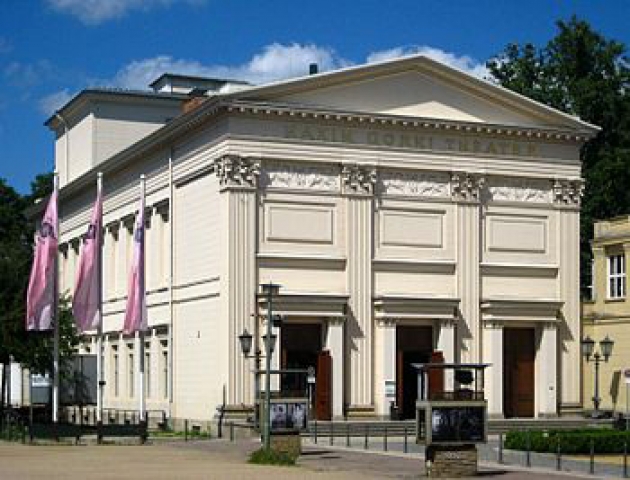Maxim Gorki Theatre, Berlin: Winterreise
'Trip in Winter' by New Group: Exil
By: Angelika Jansen - Apr 11, 2017
Maxim Gorki Theatre, Berlin, Germany
Current Schedule Includes: Winterreise (Trip in Winter)
by Yael Ronen, with Group Exil
As expected, the Maxim Gorki Theater is presenting issues that reflect the 'now and how' of living circumstances in present day Berlin. The opening of Winterreise (Trip in Winter) on April 8th, by the in-house Israeli director Yael Ronen, gave a platform to their newly founded theatre group Exil. This group will be part of the Gorki ensemble for two years, where it will create theatre events in dialogue with their own sensibilities. To this end it is most helpful that all the performances in the theatre are subtitled in English and/or in German if necessary. Exil consists of seven actors and actresses that are not allowed to perform in their home countries of Syria, Palestine and Afghanistan.
The group is aptly named, as they are in exile. In this very first production six of them were not in flight but on a two-week bus trip with Niels Bormann as their German guide throughout wintry Germany and Zurich. Their commentaries about what they see are at the same time hilarious as well as sad. Hilarious, when they mull over sexual behavior patterns or bathroom attitudes in Germany. Sad it is, when observing a Pegida demonstration against foreigners, they only wonder why Germans want potatoes instead of 'Doener,' when, to their knowledge, this Middle Eastern Meat includes potatoes. These commentaries are humorous and naive, since the German, Bormann, is afraid to confront them with the truth when they encounter a right wing Pegida demonstration in Dresden (Pegida: an ultra-right group that lives from creating strong anti-foreigner sentiments).
Winterreise alludes to the German composer Franz Schubert's cycle of songs with the same name. His cycle is dark and foreboding, the same as some of the stories told by the actors about their own flight to their new home in Germany. But it is the comedy of errors from the observations by the members of the ensemble that brightens and lightens the performance that predominantly consists of commentaries on German life as gleaned by these actors from foreign lands. They act against a backdrop of images that were filmed from the moving van. The mostly youngish audience was jubilant. Perhaps they were relieved as not to have to deal with the serious subject of integration of foreigners in a didactic manner.
Short of some acrobatic saltoes from the actors, there is little dramatic movement. The work centers around a poem by Bertolt Brecht, that is being read in its entirety, about the misnomer of the concept of emigrants. It interprets the literal translation of the word as people leaving the country when in reality they had to flee and were banned, not to find a new home but to be in exile. This will become an issue of discussion for the ensemble of Exil in its future performances and when it tours through 10 German cities and Zurich. At least this may be the hope of Shermin Langhoff and Jens Hilllje, the directors of the Maxim Gorki Theatre. Judging from the huge applause, the emigrant actors from Syria, Palestine and Afghanistan have reached their audience.



